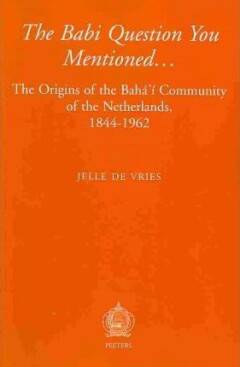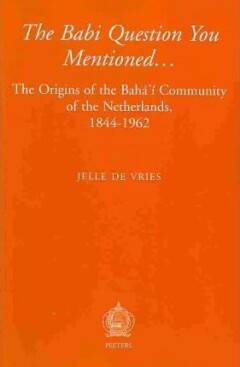
Bedankt voor het vertrouwen het afgelopen jaar! Om jou te bedanken bieden we GRATIS verzending (in België) aan op alles gedurende de hele maand januari.
- Afhalen na 1 uur in een winkel met voorraad
- In januari gratis thuislevering in België
- Ruim aanbod met 7 miljoen producten
Bedankt voor het vertrouwen het afgelopen jaar! Om jou te bedanken bieden we GRATIS verzending (in België) aan op alles gedurende de hele maand januari.
- Afhalen na 1 uur in een winkel met voorraad
- In januari gratis thuislevering in België
- Ruim aanbod met 7 miljoen producten
Zoeken
The Babi Question You Mentioned...
The Origins of the Baha'i Community of the Netherlands, 1844-1962
J de Vries
€ 56,45
+ 112 punten
Omschrijving
Starting with an assassination attempt on the life of the Shah, the restoration of Dutch-Iranian trade relations, and the first Dutch eyewitness accounts on the emergence of the Baha'i religion in 19th-century Iran, this study presents a detailed and illustrated description of the introduction of a new religious identity in a Western country. Being one of the very few successful, international and independent new religious movements of the last two centuries the Baha'i Faith offers the student of comparative religion - in the words of the British orientalist Edward G. Browne - a unique opportunity to 'examine by the light of concurrent and independent testimony one of those strange outbursts of enthusiasm, faith, fervent devotion, and indomitable heroism - or fanaticism, if you will - which we are accustomed to associate with the earlier history of the human race; he may witness, in a word, the birth of a faith which may not impossibly win a place amidst the great religions of the world.' The Babi Question You Mentioned... has seized that opportunity.
Specificaties
Betrokkenen
- Auteur(s):
- Uitgeverij:
Inhoud
- Aantal bladzijden:
- 362
- Taal:
- Engels
- Reeks:
- Reeksnummer:
- nr. 3
Eigenschappen
- Productcode (EAN):
- 9789042911093
- Verschijningsdatum:
- 2/04/2002
- Uitvoering:
- Paperback
- Formaat:
- Trade paperback (VS)
- Gewicht:
- 689 g

Alleen bij Standaard Boekhandel
+ 112 punten op je klantenkaart van Standaard Boekhandel
Beoordelingen
We publiceren alleen reviews die voldoen aan de voorwaarden voor reviews. Bekijk onze voorwaarden voor reviews.









